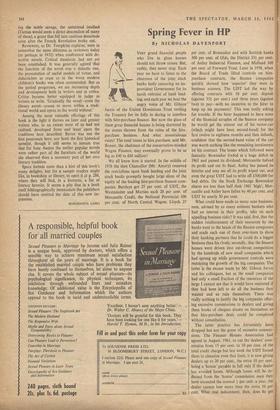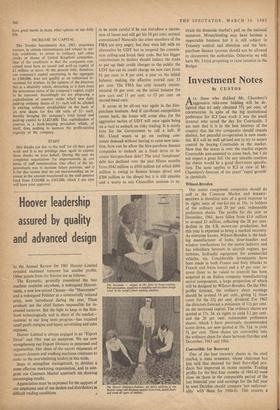Spring Fever in HP
By NICHOLAS DAVENPORT We all know how it started. In the middle of 1958 the then Chancellor (Mr. Amory) removed the restrictions upon bank lending and the joint stock banks promptly bought large slices of the equity of the leading hire-purchase finance com- panies. Barclays got 25 per cent. of UDT, the Westminster and Martins each 20 per cent. of Mercantile Credit, the National Provincial 100 per cent. of North Central Wagon, Lloyds 25 per cent. of Bowmaker and with Scottish banks 100 per cent. of Olds, the District 331 per cent. of Astley Industrial Finance, and Midland 100 per cent. of Forward Trust. Later in 1958, when the Board of Trade lifted controls on hire- purchase contracts, the finance companies quickly showed how 'superior' they were in business acumen. The UDT led the way by offering contracts with 10 per cent. deposit (against 331 per cent.) and three years (against two) to pay—with no incentive to the hirer to keep up his payments! This was really asking for trouble. If the hirer happened to have none of the financial scruples of the finance company he would get the utmost out of his motor-car (which might have been second-hand) for the first twelve to eighteen months and then default, confident that the second-hand value of the car was worth nothing like the remaining instalments on his contract. The losses which followed were fantastic. Bowmaker traded at a huge deficit in 1961 and passed its dividend; Mercantile halved its profit and cut its final; Astley has passed its interim and may see all its profit wiped out, and even the great UDT had to write off £500,000 for bad debts. On the Stock Exchange Bowmaker shares are less than half their 1961 'high'; Mer- cantile and Astley have fallen by 40 per cent. and UDT by nearly 30 per cent.
What could have made so many sane business- men, advised by so many eminent bankers who had an interest in their profits, take on such appalling business risks? It was said, first, that the sudden reinforcement of their resources by the banks went to the heads of the finance companies and made each one of them over-keen to show their banking partners that he could do a bigger business than his rivals; secondly, that the finance houses were driven into cut-throat competition by the hundreds of new small companies which had sprung up while government controls were restricting the growth of the big companies. The latter is the excuse made by Mr. Gibson Jarvie and his colleagues, but as the small companies had only a small fraction of the resources of the large I cannot see that it would have mattered if they had been left to do all the business they wanted and so ruin themselves. There was really nothing to justify the big companies offer- ing excessive commissions to dealers and giving them books of cheques drawn on themselves so that hire-purchase deals could be completed without consultation.
The latter practice has fortunately been dropped but not the grant of excessive commis- sions. The Finance Houses Association had agreed in August, 1961, to cut the dealers' com- mission from 15 per cent. to 10 per cent. of the total credit charge but last week the UDT forced them to abandon even that limit; it is now giving dealers up to 20 per cent., the extra 10 per cent. being a 'bonus' payable in full only if the dealer has avoided losses. Although losses will be de- ducted from the 'bonus' commission once they have exceeded the normal 1, per cent. a year, the dealer cannot lose more than the extra 10 per cent. What real inducement, then, does he get
have great merits in many other spheres of our daily life.
INCREASE IN CAPITAL The Trustee Investments Act, 1961, empowers trustees, in certain circumstances and subject to cer- tain conditions, to invest in ordinary and other stocks or shares of United Kingdom companies. One of the conditions is that the companies con- cerned must have an issued and paid-up capital of £1 million or more. At the present time, therefore, our company's capital amounting in the aggregate to £500,000, does not qualify as an authorised in- vestment for trustees. In the opinion of the directors this is a disability which, detracting as it does from the investment status of the company's capital, ought to be removed. Accordingly we arc proposing a capitalisation of reserves under which new fully paid-up ordinary shares of 5/- each will be allotted to existing ordinary stockholders on the basis of six new shares for five old units of 5/- each, thereby bringing the company's total issued and paid-up capital to £1,023,800. This capitalisation of reserves is a book-keeping procedure which, of itself, does nothing to increase the profit-earning capacity of the company.
STAFF Our thanks are due to the staff for all their good work and it is my privilege once again to express those thanks on your behalf. During the year we completed negotiations for improvements in our terms of staff remuneration. One effect of the im- provements was to increase future pensions, and it is for this reason that we are recommending an in- crease in the amount transferred to the staff pension fund from £330,000 to £365,000, which I am sure will have your approval.
to be more careful if he can introduce a succes- sion of losses and still get his 10 per cent. normal commission? Naturally the other members of the FHA are very angry, but they were left with no alternative by UDT but to suspend the commis- sion ceiling and break their code. But lest bigger commissions to dealers should induce the trade to put up their credit charges to the public the UDT has cut its credit charge on new cars from 81 per cent. to 8 per cent, a year on the initial balance, making the effective overall rate 15 per cent. The FHA has only recently recom- mended 10 per cent. on the initial balance for new cars and 11 per cent. to 13 per cent. on second-hand cars.
It seems to be all-out war again in the hire- purchase business. And if cut-throat competition comes back, the losses will come also, for the aggressive tactics of UDT will once again bring on a race to embark on risky trading. It is surely time for the Government to call a halt. If Mr. Lloyd wants to go on curbing con- sumer demand without having to raise new taxa- tion, how can he allow the hire-purchase finance companies to embark on a fresh drive to in- crease hire-purchase debt? The total 'instalment' debt has declined over the past fifteen months from £942 million to £910 million (of which £606 million is owing to finance houses direct and £304 million to the shops) but it is still sizeable and a worry to any Chancellor anxious to re- strain the domestic market's pull on the national resources. Moneylending may have become a respectable business but it is still subject to Treasury control and direction and the hire- purchase finance tycoons should not be allowed to circumvent the authorities. Otherwise we will have Mr. Lloyd proposing to raise taxation in the Budget.



































 Previous page
Previous page